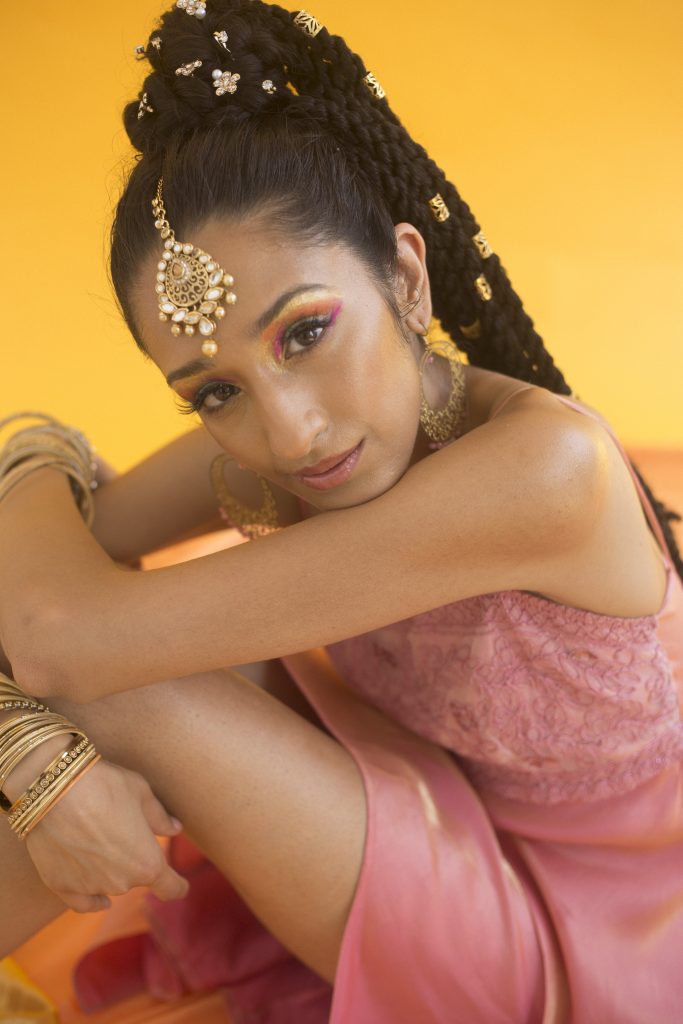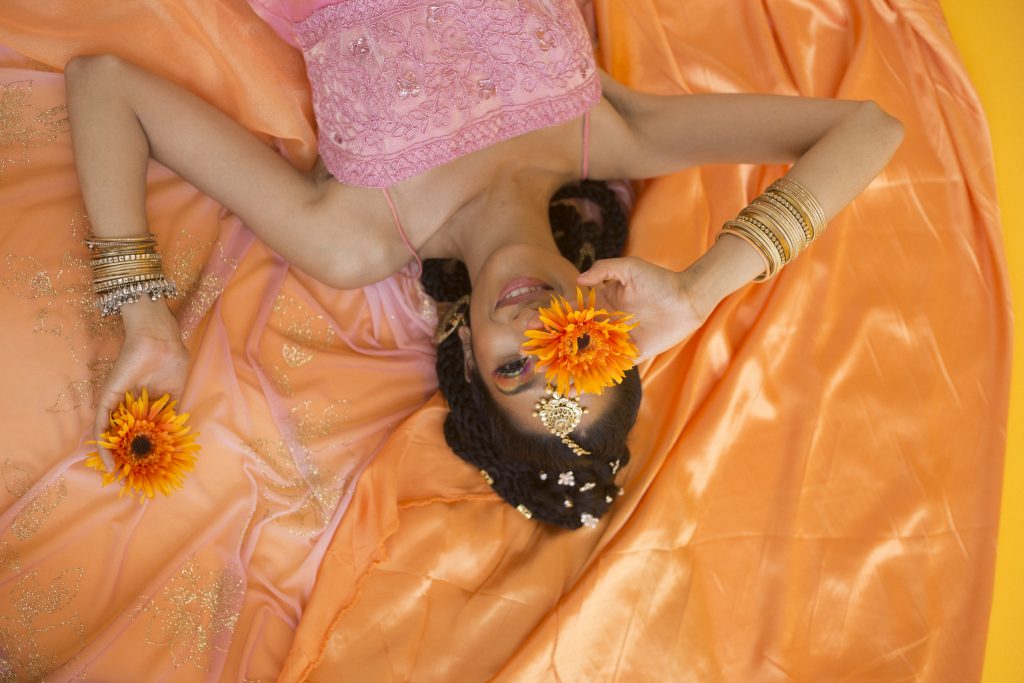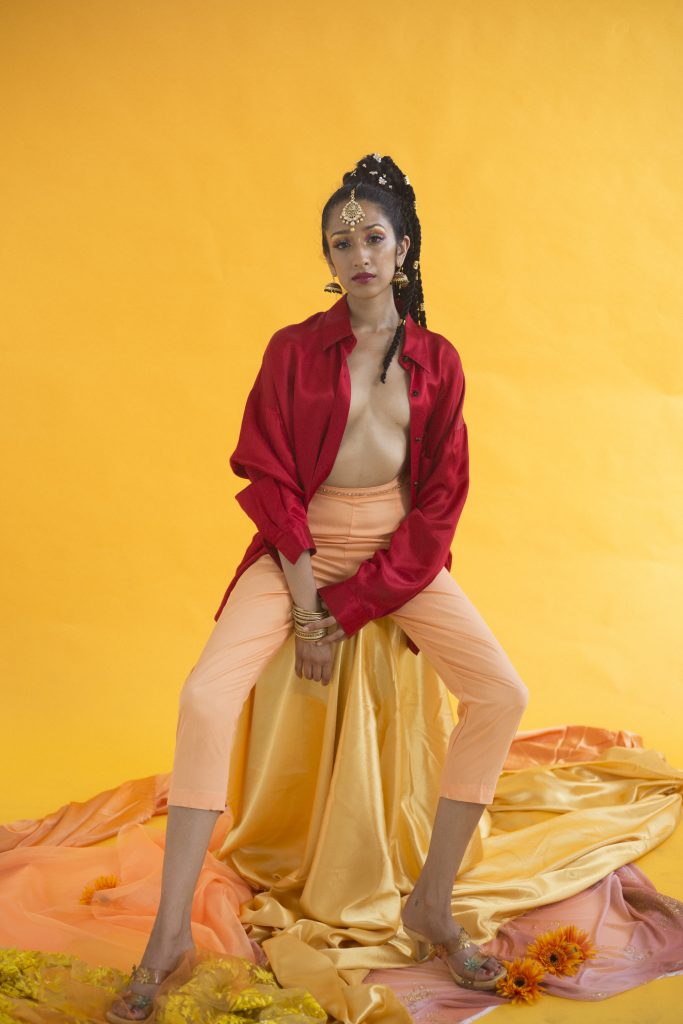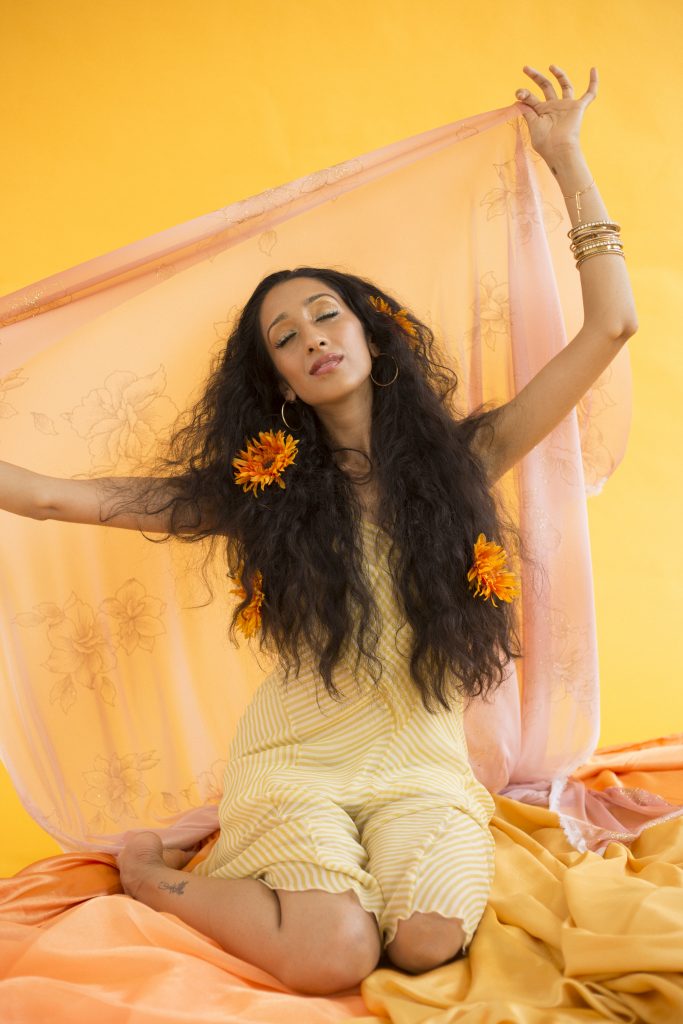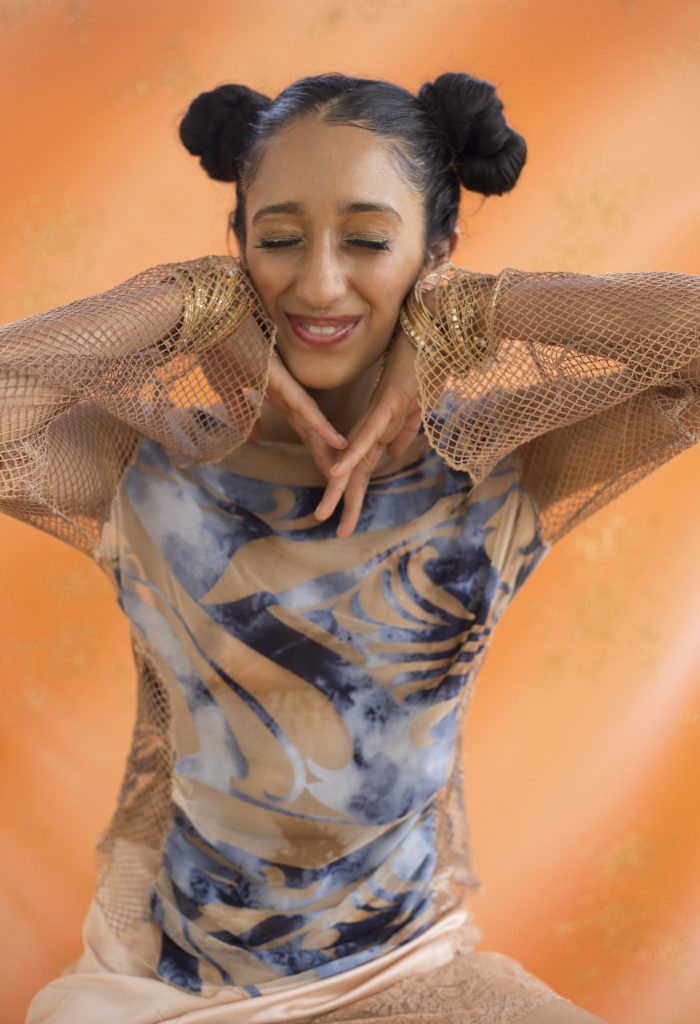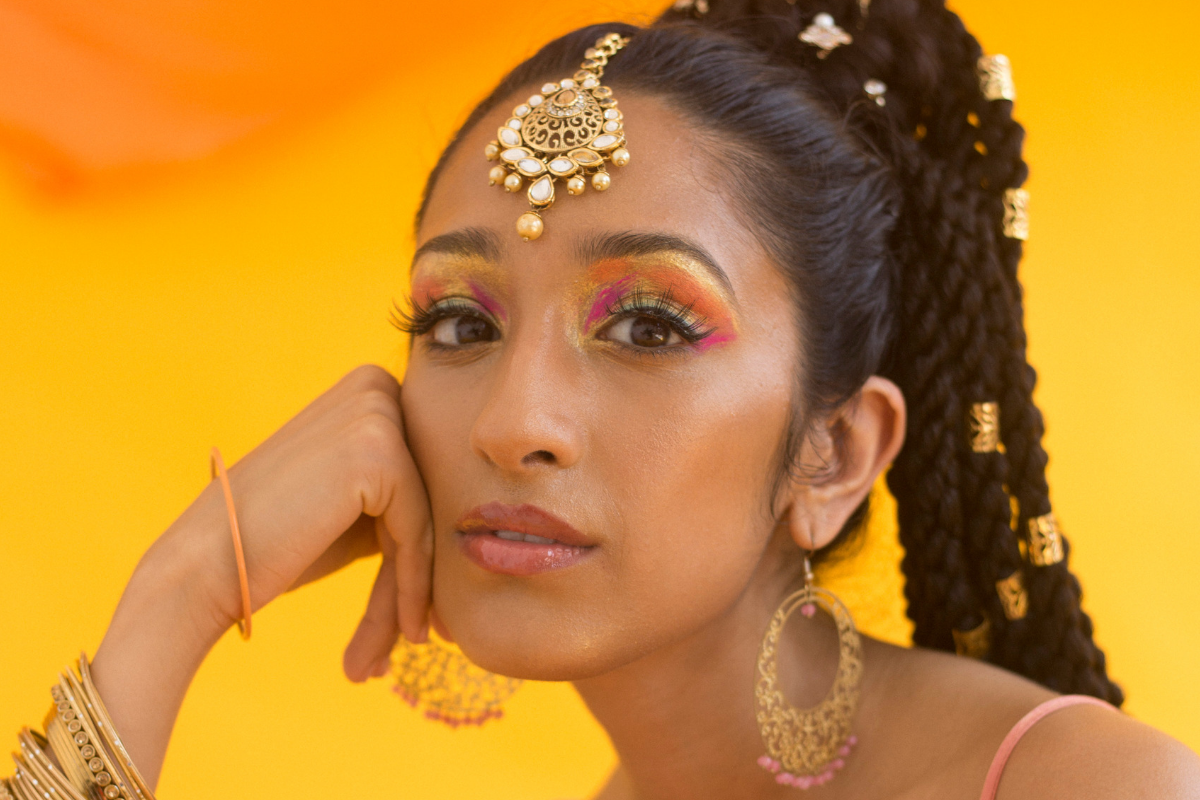
Mahaneela Choudhury-Reid
Raveena Aurora stands tall, wearing a purple slip dress and greets me with a hug. The last time we met IRL was right before the whirlwind of her career began. On this second meeting, her face lights up with a smile, like a childhood friend I haven’t seen in years. In our interview, she speaks from the heart, and we bond over male power dynamics in music and our shared upbringing in South Asian households. It was a testament to what doesn’t need to be explained between two women who grew up thousands of miles away from each other but with similar stories, and the way healing can from come from moments of laughter, pause, and shared reflection.
Just a year ago, the R&B singer, who was raised in Connecticut, was writing tracks with her producer/boyfriend in her New York apartment, a spot primarily accessible by ferry (something she sees as romantic) and working a 9-5 to fund her music and lifestyle. Eight months later, she’s set to perform at Camp Flog Gnaw, Tyler the Creator’s LA music festival, where she shares the line-up with artists like Kanye West, Kid Cudi, and The Internet. She has just finished a seven-city sold out US tour, and has racked up over 650,000 monthly listeners on Spotify (though her top tracks are streaming in the three million range). Some of her most popular tracks include ‘Sweet Time’ and ‘If Only,’ from her 2017 EP, Shanti. Her debut album is scheduled for release in early 2019.
“I want to make music to heal – that’s emotional and embraces the softest parts of people’s beings”
She sits across from me in a Brooklyn coffee shop, drinking from a blue and orange can and speaking with an openness that feels rare for an artist with so much buzz around them. But for the 24-year-old, honesty is central to everything she does. Whether it’s releasing a track or posting on her Instagram story, she wants to “hold a space in music that takes pride in vulnerability, peacefulness, colour and in something ethereal and sweet. I want to make music to heal – that’s emotional and embraces the softest parts of people’s beings.”
Her soft voice is sweet, reminiscent of a lullaby. And with muted soft colour palettes, her visuals match up. Raveena’s video for the 2018 single ‘Honey’ featured grainy purple and blue-hued shots zooming in on her glossy lips and silky yellow dress. Her style and sound, which she describes as “tender, deeply emotional, and raw”, floats in a soft space, as if existing on a different plane.
When I ask about the “secret to her sound”, which envelopes you in flower petals and feels like sunny Sunday mornings, she credits her relationship with her producer. Raveena can hold listeners in a way only a few special artists can. “We have a connection and mutual understanding of what we want for the sound that runs so deep and he knows me so well,” she says of her producer. “There is a beauty in knowing someone that well; it becomes easier to communicate ideas the more you work together and the process flows very effortlessly. The space that we make music in is so intimate, so safe, so loving… When the music is coming from a place that pure, I think it definitely seeps through the sound.”
Often performing in front of a sunflower-adorned mic, Raveena’s live shows are a meditative space for fans where they can connect in a “loving way” with those around them. “So many people talk about my music having some kind of peaceful or healing effect on them,” she says. “It really depends on the crowd and how willing they are to let go and engage in that way, but on the tour, every night the people were super incredible and I felt such a pure energy in the room.” Raveena’s fans are endearing; she calls them the “kindest souls”.
Even though she sees herself as “totally half and half―Indian and American”, across the world, her sound has struck a chord with young South Asian girls, and more broadly, young women of colour. She employs desi motifs and wears a bindi on stage.
However, she believes that South Asian culture can be quite secretive, to the detriment of its young women. “Generations before us were all about appearing perfect, and not showing the downsides of your personal life and not being comfortable or [truly] open with those closest to you. That perpetuates abuse, sexual assault, and intergenerational trauma,” she says. She wants to “undo that mindset” and use her music to create a space to talk about real issues that might traditionally be swept under the rug.
Those issues include Raveena’s journey with her sexuality and relationships. Growing up with South Asian immigrant parents like my own, it was rare for women’s sexuality or desire to be talked about. That can lead to feelings of repression, and a struggle to find power in asking for what you want. “I didn’t have that much self-worth because South Asian culture is so based in the patriarchy and has so many subliminal messages about how women are less than men – that women are meant to serve men and are inferior,” she says. “At the same time, in Western media, I didn’t see anyone of my colour or heritage, which didn’t help. The combination of that was hard to overcome.”
“Initially I viewed myself as an object and as an exotic ‘thing’ and it took me a long time to get to a place where that kind of sensuality was for myself”
Ownership of sexual and personal identity means so much to young women of colour, who may feel they don’t have autonomy over their bodies. “Initially I viewed myself as an object and as an exotic ‘thing’ and it took me a long time to get to a place where that kind of sensuality was for myself. I couldn’t approach my sexuality or sensuality in that way for so long because I didn’t have as much self-worth.” Learning to understand herself separate from an object for others’, and an “exotic woman” in Western eyes, has been a large part of Raveena coming into herself.
While her culture has required her to do some unlearning, parts of it have helped influence her sound, like Bollywood. After listing Lagaan and Monsoon Wedding as some of her favourite flicks, she says that the genre was a place she felt represented. “Bollywood movies are made for dreamers and escapists – watching them as a kid was definitely a form of escapism for me and empowering because I was seeing stories with people who looked like me on the screen. While they definitely have their issues (like colourism, no queer representation, lack of Sikh/Muslim representation), the wildly colourful and larger-than-life, romantic essence of Bollywood movies has always been a source of inspiration to me.”
Those South Asian roots are also part of why she feels so connected to the UK, and why she fell in love with the city when she spent time there last autumn, living between Berlin and London for the season. “I found an incredible network of PoC out there through groups like gal-dem and Makrooh (a UK-based platform for PoC and artists of colour). The people there are so humble and warm,” she says. “The South Asian arts scene also seems a bit more developed than here – it’s literally birthed some of my favourite artists like Jai Paul and M.I.A.”
“I’m soft, yes, I’m vulnerable and sweet, but I handle a lot at the same time. I’m very strong and I can make work that should be respected”
Recognition that the music industry will always want to put her into boxes, and try to take that autonomy away from her means that she wants to tell young women that they can live outside of whatever notions and stereotypes people have of them. At first, she tried to shape herself and her sound based on men’s opinions in the industry. “Once I came into myself it was so empowering. The vision is all mine,” she says. “As women, we are only allowed to have a certain amount of dimensions in the [eyes of the] media. My goal is to break down that idea and show that people are multi-faceted. And I’m soft, yes, I’m vulnerable and sweet, but I handle a lot at the same time. I’m very strong and I can make work that should be respected. That duality is okay. Women are allowed to be multi-faceted.”
The most poignant part of the interview comes from something she says in passing, but that grasps at what many artists can’t understand. “I don’t want to get lost in the sauce of the music industry,” she jokes, but the sentiment is serious. “I never want to be an artist that has other people making crucial creative decisions for them (or even the really small, detailed ones), or be this artist that gets caught in that unhealthy place of making things simply for consumption.” That vision and Raveena’s autonomy over her life, her body, and what she creates is really at the core of it all. “Only I can tell my story,” she says.
As it all happens – the tours, the festivals, the music videos, the interviews – she’s just trying to make space to breathe. Although the chaos of what feels like overnight success can be amazing, it can also be overwhelming for a new musician, especially one who calls herself “extremely sensitive”. Her focus lies away from the industry and instead with making the music, taking time for herself, and affirming fans in the way they affirm her every day. Most importantly, she says, “I’m protecting my peace.”
Raveena’s debut album, Lucid, is available 31 May. You can pre-order / pre-save here.
From gal-dem’s third print issue on the theme of secrets

